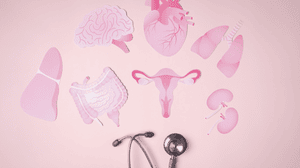Nobody likes being bloated – but for some of us, the feeling is all too common. Whether it’s after a big meal, or when it comes out of nowhere, being bloated can leave you feeling sluggish and unconfident at best, or cause you to feel nausea and stomach pain at worst. Although we’re all bound to feel bloated at some time – whether it’s after sharing big family meals in the holiday season, or while sampling the many culinary treats of an overseas destination – feeling bloated more days than not can seriously impact your quality of life.
So how do we beat the bloat? We’ve put together a number of tips to help you – from deciphering which foods might be causing you to bloat, how to deal with bloating, and ways you can support your overall gut health to minimise bloating and other symptoms of IBS such as constipation, diarrhea, and abdominal pain. It can be upsetting, frustrating, and even isolating while you try to figure out and manage what’s causing you to feel bloated. But by following our tips and guidelines, you may be able to find the answer you need.
4 common causes of bloating
There are a range of reasons why we might get bloated, and they aren’t always as obvious as eating too much in one sitting, or indulging in a ‘problematic’ food. Even if you lead a healthy life, bloating can affect you regularly. If you’re often feeling bloated after you eat, or even from when you wake up, you’ll probably be eager to figure out what’s causing it.
1. Irritable bowel syndrome (IBS)
Although we might not want to talk about it, perhaps because it’s not the most glamorous thing to have, many of us can feel bloated due to irritable bowel syndrome (IBS). IBS can be embarrassing, and downright inconvenient – nobody wants to rush to the toilet after having dinner at the in-laws’ place, or start getting the tummy rumbles during a silent exam. Diarrhea, pain in the intestines, bloating, and constipation can all be symptoms of IBS, and they can strike at any time. If you think you may have it, it’s important to speak to your doctor to develop ways to manage it.
You may be surprised how many people do deal with IBS on a daily basis. It is estimated that 1 in 20 people living in the UK suffer from IBS.[1] For managing IBS, the NHS recommends cooking at home with fresh ingredients, keeping a food diary to better identify and avoid trigger foods, avoiding stress, exercising regularly, and trying probiotics.[2] Taking probiotics like Zenflore® can be a great way to support not only your digestive health, but your overall health, mental wellness, and immunity, too – so it’s a win-win.
2. Food intolerances
If it feels like you’re bloated more often than not, certain foods could be triggering your intestines to bloat by causing gas and water to accumulate there. If you’re suffering from bloating regularly, it’s important to first go to your doctor to determine whether you have any common food intolerances, such as coeliac disease or lactose intolerance. Coeliac disease is a condition where your immune system attacks your own tissues when you eat gluten. Coeliac disease is a medical condition characterized by an autoimmune response within your body that occurs when gluten is consumed.
Food intolerances can crop up at any point in your life, so even if you have been tested before, it’s worth going in again if you’re suffering from regular bloating and other digestive issues.
Many of us are lactose intolerant to some extent – around 68% of people have some level of lactose malabsorption.[3] For people of Southeast Asian, East Asian, West African, Native American, Hispanic, or Italian ancestry it is even more common.[4] We may become more lactose intolerant as we grow older, as our levels of lactase – the enzyme that helps to digest lactose – drop.[5]
Intolerance can vary – some people suffering from coeliac disease cannot eat foods that have come into contact with utensils, surfaces, etc with traces of gluten on them without having a severe reaction. In other cases of mild lactose intolerance, consuming dairy products may cause you to have a mild stomach ache or to feel bloated.
FODMAP foods can also be responsible for bloating. Foods that are high in FODMAPs, or Fermentable Oligosaccharides, Disaccharides, Monosaccharides And Polyols – can cause bloating as well as other IBS-like symptoms, because they can cause gas and make the intestines hold onto water.[6]
An elimination diet can help you to isolate the problematic foods from those you are more tolerant of. Starting with bland foods and then reintroducing ‘richer’ foods is often advised, but this strategy might not work for everyone. A diet low in lactose and carbohydrates, like the ketogenic diet, can also be a good starting point. Be aware that this diet has been criticised for lacking in fibre, so make sure you have a consultation with a certified dietician before you begin. They may advise you to consume more foods like avocados, artichokes, flaxseeds, and blueberries, as high-fibre foods that can be eaten on a ketogenic diet.
One important thing to remember is that each person’s body is different. Acidic foods like tomato-based stocks, soups, and sauces can affect someone negatively, while for someone else these are fine, but grains, sugars, and bread products are worse. Trying different diets, including an elimination diet, can help you to figure out which foods you can tolerate, and which foods bloat you.
3. Chewing gum
When we chew gum, we tend to swallow more air, which can cause gas and bloating.[7] Sorbitol, a sweetener found in some kinds of chewing gum, can also make some people experience diarrhea.[8] Opting for a different brand of gum, or chewing it less often, may help to prevent regular bloating.
4. An unhealthy gut microbiome
Bloating, food comas, diarrhea, and constipation can all be signs of an unhealthy gut microbiome. Making sure your gut bacteria are balanced is an important part of your overall health. Taking a probiotic supplement like Alflorex® can help to replenish the good bacteria in your gut, and support your digestion and overall health.
How to prevent bloating
There are a number of ways you can prevent bloating in your daily life, once you have spoken to a doctor to figure out what may be causing it. From eliminating trigger foods to minimising stress – you can beat the bloat by making a number of simple lifestyle changes.
Figure out your trigger foods – and manage your intake of them
Diets aren’t – and shouldn’t be – just about weight loss. A good diet nourishes your body and supports your health, making sure you get all the right nutrients you need to lead a healthy lifestyle. The perfect diet looks different for everyone, and it’s important to speak to a nutritionist before starting a new one.
If you are feeling bloated regularly, you may want to try an elimination diet. After trialing it for a while, you can start to reintroduce ‘riskier’ foods like FODMAPs, dairy products, or sugary snacks one at a time – and carefully monitor your body to see if any of the foods cause bloating. If introducing a certain food or food group has made you feel bloated again, then this is a food to avoid.
Once you’ve identified trigger foods, try and find alternatives so you don’t feel like you’re missing out. This may look like snacking on low-FODMAP strawberries instead of high-FODMAP apples, or swapping out an alternative milk for dairy in your daily coffee – which will do the environment a favour too.
A diet doesn’t have to mean cutting out your favourite foods for good. Sometimes after spending time on a more restrictive diet, you can begin to reintroduce your favourites slowly. You can also support your gut health in other ways as you reintroduce favourite foods, by leading a healthy and active lifestyle, and by taking a probiotic supplement.
De-stress
The central nervous system is closely linked to the gut, via the gut-brain axis.[9] This means that stress, anxiety, and worry can all have physical manifestations in the gut, and may result in digestive issues – including bloating.[10]
The NHS recommends stress-management techniques to help with digestion.[11] Meditating, journaling, going for walks, or talking to a therapist or friend may all help to alleviate stress.
Things you can do when you’re already bloated
What can you do when you’ve already tucked into that large pizza, with some garlic bread and a fizzy drink on the side, and now you’re filled with pizza, gas, and regret? Although bloating should normally only last a few hours, there are some things you can try to lessen it, or make it go away faster:
Medications
Many people take peppermint oil to help relieve digestive issues, particularly bloating and gas. The NHS recommends it as a natural, herbal treatment for uncomfortable digestive issues and IBS.[12]
A whole number of medications can also help to relieve bloating, reduce abdominal pain, and help speed up digestion. [13]
Meditate
Bloating and other digestive symptoms can go hand-in-hand with stress. It’s important to find ways to relax and unwind when you are under pressure, and meditating can be a great way to do this.
Go for a walk
It may feel like the last thing you want to do when you’re really bloated, but going for a walk can do wonders for your digestion, and can help to ease the effects of bloating. Slip on some comfy trousers and head to the park, and you may start to relax and digest your food more quickly, leading you to feel less bloated.
Remember, bloating is natural, and it happens to all of us. It shouldn’t stop you from going out and living your life – from indulging in a few treats every now and then, to wearing that dress to an all-you-can-eat! Just be sure to pack some peppermint oil tablets, if you need them.
References:
[1] https://gutscharity.org.uk/2023/04/ibs-awareness-month-2023/
[2] https://www.nhs.uk/conditions/irritable-bowel-syndrome-ibs/diet-lifestyle-and-medicines/
[3] https://www.niddk.nih.gov/health-information/digestive-diseases/lactose-intolerance/definition-facts#:~:text=While%20most%20infants%20can%20digest,world's%20population%20has%20lactose%20malabsorption.&text=Lactose%20malabsorption%20is%20more%20common,the%20world%20than%20in%20others.
[4] https://www.webmd.com/healthy-aging/features/lactose-intolerant-age
[5] https://www.webmd.com/healthy-aging/features/lactose-intolerant-age
[6] https://www.gastroconsa.com/patient-education/irritable-bowel-syndrome/low-fodmap-diet/
[7] https://www.livescience.com/6880-chewing-gum-give-gas.html
[8] https://www.nhs.uk/live-well/eat-well/food-types/are-sweeteners-safe/
[9] https://www.ncbi.nlm.nih.gov/pmc/articles/PMC4367209/#:~:text=The%20gut%2Dbrain%20axis%20(GBA,microbiota%20in%20influencing%20these%20interactions.
[10] https://www.nhs.uk/live-well/eat-well/digestive-health/five-lifestyle-tips-for-a-healthy-tummy/#:~:text=In%20some%20people%2C%20stress%20slows,ulcers%20and%20irritable%20bowel%20syndrome.
[11] https://www.nhs.uk/live-well/eat-well/digestive-health/five-lifestyle-tips-for-a-healthy-tummy/#:~:text=In%20some%20people%2C%20stress%20slows,ulcers%20and%20irritable%20bowel%20syndrome.
[12] https://www.nhs.uk/medicines/peppermint-oil/#:~:text=Peppermint%20oil%20is%20a%20type,Peppermint%20oil%20comes%20as%20capsules.
[13] https://www.nhs.uk/conditions/bloating/







